Flavor that Wows for Chocolate Lovers from Yes CaCao
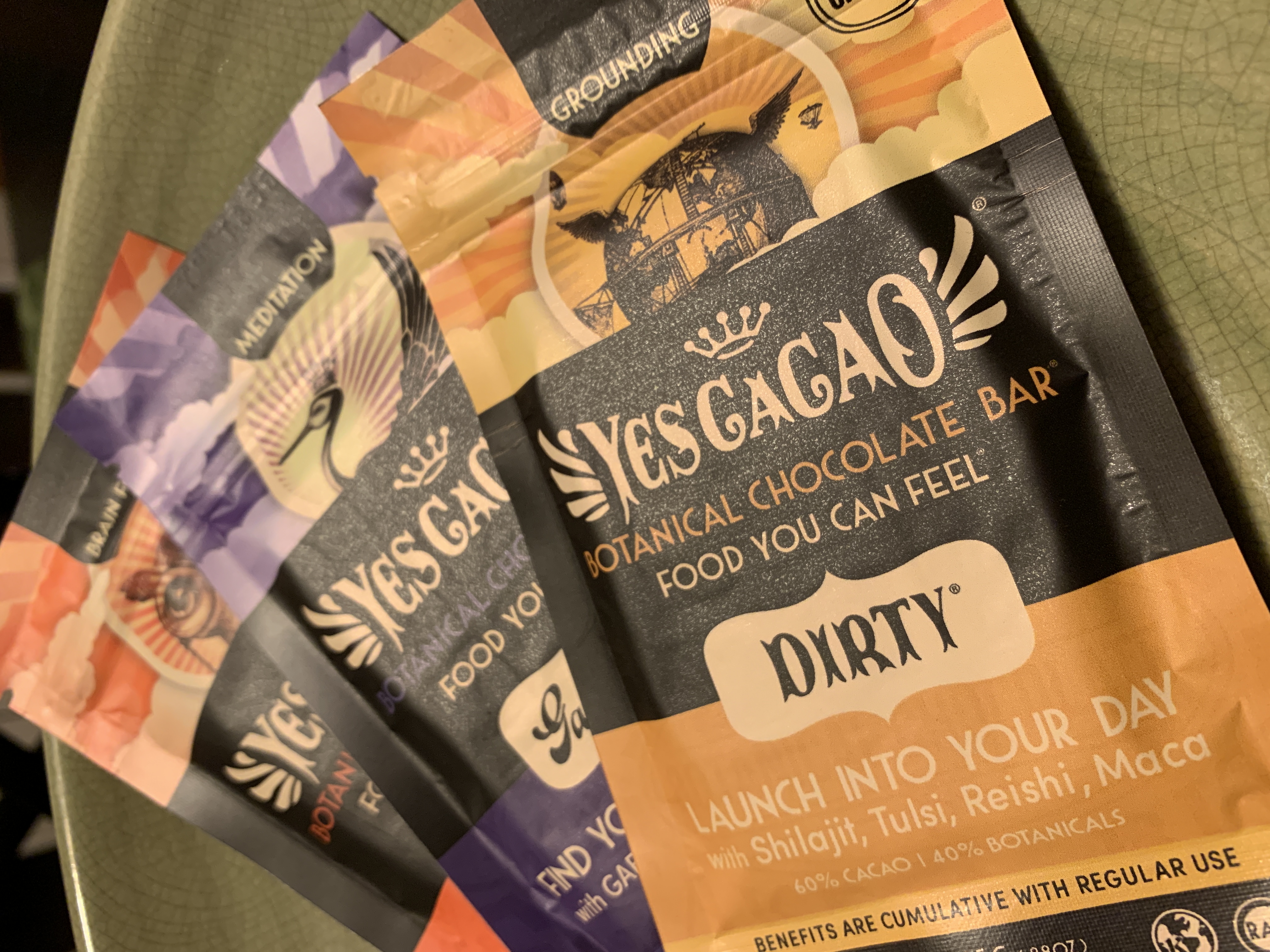
Words dear to every foodie’s heart: Here, taste this.
They said it, and we complied. Our sample botanical chocolate bars from Yes CaCao arrived in the mail, carefully wrapped and insulated like the precious objects they are.
We were treated to three Yes CaCao bars, Gaba Baba, Dirty, and Karma MellOwl. First, let us say the packaging is funky, sexy, and delightfully literary, with a hip, healthy-intellectual aesthetic. Each little chocolate wrapper is chock full of taglines and slogans: “Food You Can Feel,” “Make A Wish and Take A Bite,” and the suggestion to “Creatively Reuse This Package.” There’s lots to read here, before you even get to the confection.
The benefits of Yes CaCao bars are, they assert, cumulative with regular use. Which means to us, if we eats lots of it, we will get lots of benefits. Sounds like a fair deal.
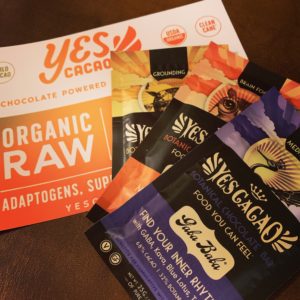
Cacao or Cocoa, What’s the Diff?
The tropical cacao pod holds cacao beans. The beans are processed by one of two different methods to produce either cacao or cocoa.
Raw cacao is made by cold-pressing unroasted cacao beans. Cold-pressing cacao beans, just like cold-pressing coffee beans, preserves the living enzymes. Living enzymes in cacao may have health benefits, depending upon the finished product. In cacao beans, cold-pressing also removes the cacao butter, which accounts for a significant amount of the fat that is in cocoa.
Cocoa looks the same as cacoa, but it is attained with a totally different process. When raw cacao is roasted at high temperatures, and then ground into powder, the result is cocoa. The roasting process destroys the living enzymes.
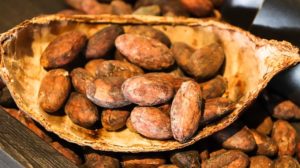
Cocoa and chocolate contain compounds purported to reduce artery-clogging plaque and lower the risk of some cancers. Dark chocolate, especially, is coveted for its antioxidant properties and the alkaloid theobromine that it contains.
Cacao – the cold-pressed product of the cacao pod – is considered a superfood. It contains more antioxidants than blueberries, as well as significant amounts of iron, calcium, and magnesium. The cacao content of dark chocolate is why dark chocolate is considered to have health benefits.
Don’t let Carob Confuse You
Carob, which is often marketed as a vegan/vegetarian and non-caffeinated substitute for chocolate, is also harvested as a tropical pod. The carob pod contains a sweet, edible pulp, and inedible seeds. Carob food product is created by roasting the pulp and grinding it into a powder. Carob powder resembles cocoa powder, although the flavor and texture is different, whether used as a powder in recipes, or as a carob bar candy.
Botanical Chocolate Bars You Will Love
The chocolate bars from Yes CaCao carry a huge punch of cacao, as you would guess from the name. The primary ingredient (from 41-68% depending upon the flavor) of each 25 gram bar is organic, wild, cacao. Add sun-dried cane sugar and the most tantalizing combination of herbs and you may have found your new addiction.
Gaba Baba, which will help you “Find Your Inner Rhythm,” is 32% botanicals: GABA, Kava, Blue Lotus, and Turmeric. Dirty, to assist with a “Launch Into Your Day,” contains Shilajit, Tulsi, Reishi, and Maca. The botanicals in Karma MellOwl, will help you “Master Your Mind,” with 59% botanical infusion of Turmeric, Bacopa, and Lions Mane. Yes CaCao offers more flavors; we tried the three above.
Our first impression is that the bars are, well… little. Our second impression is that they pack a huge flavor punch. With the huge percentage of botanicals in each variety, you can definitely taste something different. Different from dark chocolate, different from milk chocolate, different from just about anything you’ve probably eaten before. Get past that first taste bud challenge, regroup your expectations. You will taste the turmeric in the Karma MellOwl, and coriander and vanilla in the Gaba Baba, and the exotic notes of Maca, Mesquite and Reishi in Dirty. (My favorite was Gaba Baba. And the promise of discovering my inner rhythm was tantalizing.)
The bars are designed in little squares with the Yes logo, and the packages have a little ziplock top.
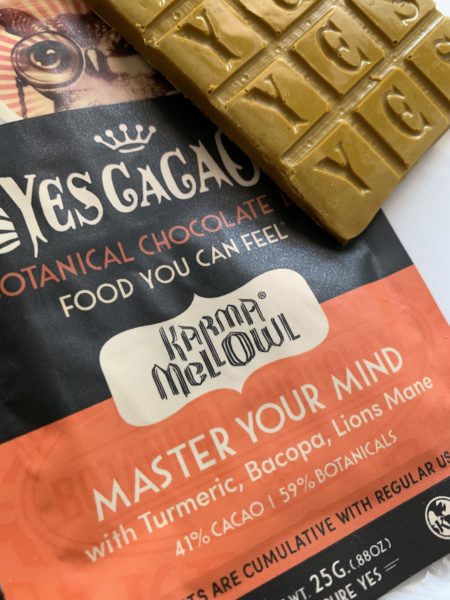
That was silly, I thought, who has leftover chocolate?
Well, this isn’t chocolate. The flavors are intense, and deeply satisfying. A couple squares are all you need to tame that “cacao (or cocoa) monster” and each bar will last a long time. We really appreciated the resealable packaging. It’s also a plus that this isn’t just another chocolate bar – even another GODIVA chocolate bar – because the price of each little package is rather dear, at around $5. A top-quality energy bar costs less, but again, that’s not what we think Yes CaCao is going for here.
Their botanical chocolate bars are really a treat in a category of their own. Distributed by Yes Life Foods, Inc., in Santa Cruz, California, Yes CaCao bars are 140-170 calories each, with about 20% calories from saturated fat. If you treat yourself to a couple of the super intense little squares for a blast of flavor, and an injection of cacao-based health benefits, the calorie content is way friendlier than traditional chocolate.
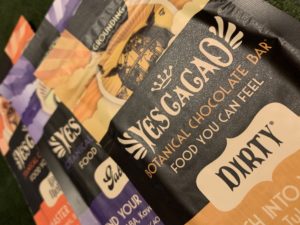
Port City Foodies can buy Yes CaCao botanical chocolate bars on an adventure to the Violet Owl in Asheville NC. A large selection of cacao bars and other products is available online from Yes CaCao.